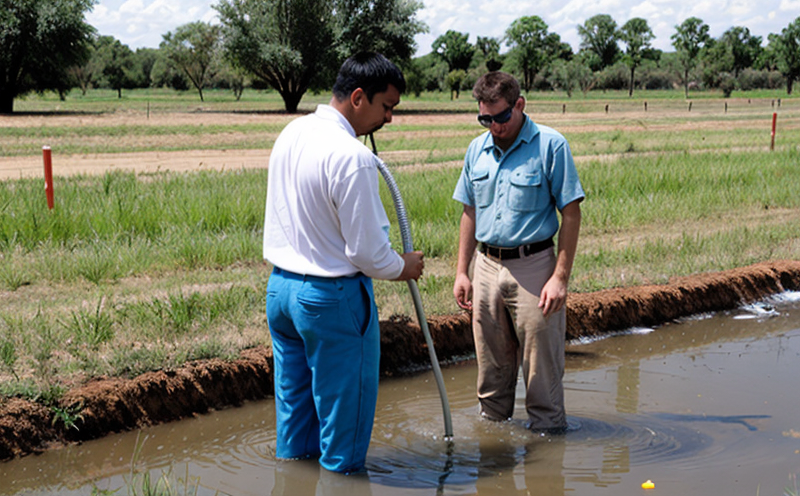ISO 10304-1 Anions Determination in Groundwater Test
The ISO 10304-1 standard provides a precise and reliable method for determining anions in groundwater. This is crucial for ensuring that water quality meets regulatory standards and environmental protection requirements. In sectors such as agriculture, mining, and urban development, it is vital to monitor anions like chloride (Cl-), bromide (Br-), nitrate (NO3-), and phosphate (PO43-) in groundwater. These elements can have significant impacts on soil health, plant growth, and aquatic ecosystems.
The test is designed to ensure accuracy and consistency across different laboratories by standardizing the procedure for sample preparation, digestion, and analysis using ion chromatography. This method allows for the detection of even trace levels of anions, making it a valuable tool in environmental monitoring programs.
Groundwater plays a critical role in sustaining ecosystems and supporting human activities. The determination of anions is essential for assessing water quality and identifying potential sources of pollution. By adhering to ISO 10304-1, laboratories can provide reliable data that helps stakeholders make informed decisions about resource management.
The procedure involves several steps: sample collection, filtration, digestion, and injection into the ion chromatography system. The resulting chromatogram provides a clear visual representation of the anions present in the groundwater sample, allowing for accurate quantification.
Water quality is not just about taste or appearance; it’s also about safety and ecological balance. By using ISO 10304-1, laboratories contribute to the protection of both human health and natural environments. This standard ensures that water resources are managed sustainably, supporting a healthier planet for future generations.
| Sample Preparation | Digestion Method | Analytical Instrumentation | Acceptance Criteria |
|---|---|---|---|
| Filtration of the sample to remove particulates | Use a microwave digestion system for thorough breakdown | Ion Chromatography System with UV Detection | Concentration limits as per ISO 10304-1 |
The ISO 10304-1 method is widely recognized and used globally. It provides a robust framework for laboratories to follow, ensuring that results are consistent and comparable across different testing facilities.
Scope and Methodology
- Sample Collection: Groundwater samples should be collected from depths suitable for the test. The depth will depend on the specific anions of interest.
- Filtration: Filter the sample to remove any particulates that could interfere with the analysis.
- Digestion: Use a microwave digestion system to break down organic matter and other components in the water, ensuring complete decomposition of all potential interfering substances.
- Injection: Inject the digested sample into an ion chromatography system for separation and quantification of anions.
The acceptance criteria are based on the limits set by ISO 10304-1. These limits ensure that any detected anions fall within acceptable ranges, which is critical for compliance with environmental regulations.
Eurolab Advantages
EuroLab offers a comprehensive suite of services to meet the needs of clients in various sectors. Our expertise in groundwater testing, particularly focusing on anions like chloride, bromide, nitrate, and phosphate, ensures that we provide accurate and reliable results.
- Accurate Results: We employ state-of-the-art instrumentation and methods to ensure precision in our measurements.
- Consistent Quality: Our laboratories are ISO 17025 accredited, ensuring consistent quality across all tests.
- Compliance Assurance: By adhering strictly to international standards like ISO 10304-1, we provide data that meets regulatory requirements and industry best practices.
- Expertise: Our team of experienced scientists and engineers brings deep knowledge in environmental testing and compliance.
EuroLab’s commitment to excellence ensures that clients receive the highest quality service, enabling them to make informed decisions with confidence.
Competitive Advantage and Market Impact
- Global Recognition: ISO 10304-1 is recognized worldwide, ensuring that results are accepted by regulatory bodies across different countries.
- Regulatory Compliance: By aligning with this standard, our clients ensure full compliance with environmental regulations.
- Eco-Friendly Solutions: Our testing services contribute to the protection of ecosystems and water resources, supporting sustainable development.
- Client Satisfaction: Accurate, reliable data helps clients make informed decisions that benefit both their operations and the environment.
The demand for groundwater monitoring is increasing due to growing concerns about environmental sustainability. EuroLab’s commitment to providing high-quality testing services positions us as a leader in this field, helping clients stay ahead of market trends and regulatory changes.





